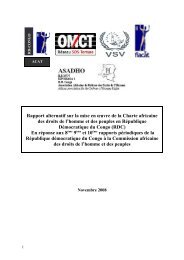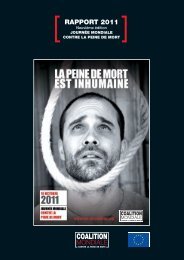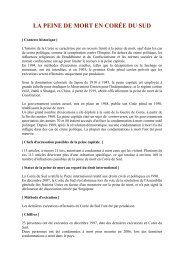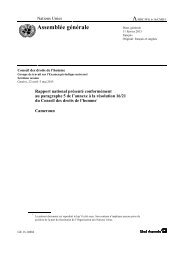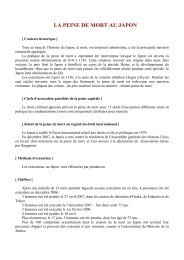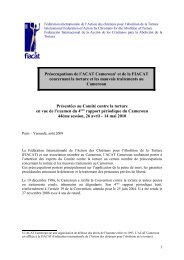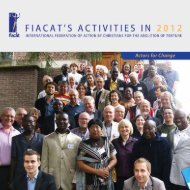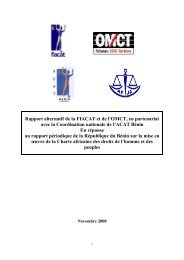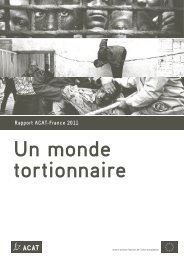Defusing the Ticking Bomb Scenario - fiacat
Defusing the Ticking Bomb Scenario - fiacat
Defusing the Ticking Bomb Scenario - fiacat
Create successful ePaper yourself
Turn your PDF publications into a flip-book with our unique Google optimized e-Paper software.
<strong>Defusing</strong> <strong>the</strong><strong>Ticking</strong> <strong>Bomb</strong> <strong>Scenario</strong>Why we must say Noto torture, always.
<strong>Defusing</strong> <strong>the</strong> <strong>Ticking</strong> <strong>Bomb</strong> <strong>Scenario</strong>:Why we must say No to torture, alwaysPublished by The Association for <strong>the</strong> Prevention of TortureCOPYRIGHT © 2007, Association for <strong>the</strong> Prevention of TortureAll rights reserved. Materials contained in this publication may be freelyquoted or reprinted, provided credit is given to <strong>the</strong> source. Requests forpermission to reproduce or translate <strong>the</strong> publication should be addressedto <strong>the</strong> APT (see address below).ISBN 2-940337-16-0For copies of this publication and fur<strong>the</strong>r information, please contact:The Association for <strong>the</strong> Prevention of Torture (APT)P.O. Box 2267CH 1211 Geneva 2SwitzerlandTel: + 41 22 919 2170Fax: + 41 22 919 2180E-mail: apt@apt.chWebsite: www.apt.chCover illustration by Adele JacksonDesign and layout by minimum graphicsPrinted by SADAG, France
<strong>Defusing</strong> <strong>the</strong><strong>Ticking</strong> <strong>Bomb</strong> <strong>Scenario</strong>Why we must say No totorture, always.
AcknowledgementsThis text was prepared by <strong>the</strong> Association for <strong>the</strong> Prevention of Torture(APT) based on consultation with <strong>the</strong> following individuals and organisationspresent at a meeting held in Geneva in June 2007:Amnesty International.Dr Jean Maria Arrigo, International Intelligence Ethics Association.Sylvie Bukhari-de Pontual, President, International Federation ofAction by Christians for <strong>the</strong> Abolition of Torture (FIACAT).Claire Chimelli, Geneva Representative, International Federation ofAction by Christians for <strong>the</strong> Abolition of Torture (FIACAT).Ralph Crawshaw, former Police Chief Superintendent; Fellow, EssexHuman Rights Centre.Edouard Delaplace, UN & Legal Senior Programme Officer, Associationfor <strong>the</strong> Prevention of Torture (APT).Carla Ferstman, Director, The Redress Trust.Bernadette Jung, Delegate of International Bureau, International Federationof Action by Christians for <strong>the</strong> Abolition of Torture (FIACAT).Anne-Laurence Lacroix, Deputy Director, World Organisation AgainstTorture (OMCT).David Luban, University Professor and Professor of Law and Philosophy,Georgetown University Law Center.Nieves Molina Clemente, Legal Adviser, International RehabilitationCouncil for Torture Victims (IRCT).Matt Pollard, Legal Adviser, Association for <strong>the</strong> Prevention of Torture(APT).Eric Prokosch, Board Member, Association for <strong>the</strong> Prevention of Torture(APT).Dr Jose Quiroga, Vice-President, International Rehabilitation Councilfor Torture Victims (IRCT).Dr Lawrence Rockwood, former military counter-intelligence officer.Sir Nigel Rodley, Professor of Law and Chair of <strong>the</strong> Human Rights Centre,University of Essex; Member of UN Human Rights Committee;former UN Special Rapporteur on Torture.James Ross, Senior Legal Advisor, Human Rights Watch.Eric Sottas, Director, World Organisation Against Torture (OMCT).Wilder Tayler, Deputy Secretary General, International Commission ofJurists (ICJ).Mark Thomson, Secretary General, Association for <strong>the</strong> Prevention ofTorture (APT).Fernando Delgado, JD Candidate, Harvard Law School.
<strong>Defusing</strong> <strong>the</strong><strong>Ticking</strong> <strong>Bomb</strong> <strong>Scenario</strong><strong>Defusing</strong> <strong>the</strong> <strong>Ticking</strong> <strong>Bomb</strong> <strong>Scenario</strong> reaffirms and reinforces<strong>the</strong> absolute and non-derogable prohibition oftorture and all o<strong>the</strong>r forms of cruel, inhuman or degradingtreatment or punishment, against challenges based on<strong>the</strong> so-called ticking bomb scenario.Torture must be seen for what it is: abhorrent and shameful.Torture is never courageous or honourable. There is goodreason why torture, like genocide and slavery, became tabooin <strong>the</strong> modern era, and taboo it must remain.Why we must say no to torture, alwaysWhat is <strong>the</strong> <strong>Ticking</strong> <strong>Bomb</strong> <strong>Scenario</strong>?The ticking bomb scenario is a hypo<strong>the</strong>tical “thoughtexperiment” that is used to question <strong>the</strong> absolute prohibitionof torture. It can be formulated as follows:“Suppose that a perpetrator of an imminent terroristattack, that will kill many people, is in <strong>the</strong> hands of <strong>the</strong>authorities and that he will disclose <strong>the</strong> informationneeded to prevent <strong>the</strong> attack only if he is tortured. Shouldhe be tortured?”In public discussions, <strong>the</strong> scenario is often posed as a personalquestion to someone who is before an audience and says <strong>the</strong>yare against torture. In this context it is often personalised:“But suppose that you know of an imminent attack thatwill kill thousands of people and you have <strong>the</strong> perpetrator.The only way to prevent <strong>the</strong> attack is to torture him.Would you do it, yes or no?”
<strong>Defusing</strong> <strong>the</strong> <strong>Ticking</strong> <strong>Bomb</strong> <strong>Scenario</strong>Why are so many people talking about<strong>the</strong> scenario?The ticking bomb scenario operates by manipulating <strong>the</strong>emotional reactions of <strong>the</strong> audience. It creates a context offear and anger. It artificially tilts <strong>the</strong> circumstances to evokesympathy or even admiration for <strong>the</strong> torturer, and hatredor indifference towards <strong>the</strong> torture victim. Its dramaticnature has made it a favourite plotline for popular televisionprograms and action movies. It creates a powerful mentalimage that has to some extent captured <strong>the</strong> imagination ofa portion of <strong>the</strong> global public, meaning that discussion of<strong>the</strong> scenario has taken on a momentum of its own, beyondits original explicitly legal/political context. This has madeits impact a matter of grave concern, not just among humanrights organisations and advocates, but among senior membersof military institutions as well. 1Whatever <strong>the</strong> reason for its presentation in a given context,<strong>the</strong> intended effect of <strong>the</strong> ticking bomb scenario is tocreate doubt about <strong>the</strong> wisdom of <strong>the</strong> absolute prohibitionof torture. This doubt, in turn, is usually designed to lead<strong>the</strong> audience to accept <strong>the</strong> creation of a legal exception to<strong>the</strong> prohibition, or at least to accept non-application of <strong>the</strong>criminal law against torture in particular cases. The trueaim of proponents of <strong>the</strong> ticking bomb argument may be tocreate a broad exception while seeming to argue for a narrowone. By trying to force torture opponents to concede thattorture may be acceptable in at least one extreme case, proponentsof <strong>the</strong> ticking bomb argument hope to undermine1See, for example, <strong>the</strong> article “Whatever it Takes: <strong>the</strong> politics of <strong>the</strong> man behind‘24’” by Jane Mayer, <strong>the</strong> New Yorker (19 February 2007), describing <strong>the</strong> deepconcerns expressed by U.S. Army Brigadier General Patrick Finnegan, deanof <strong>the</strong> US Military Academy at West Point, about <strong>the</strong> toxic effect of <strong>the</strong> tickingbomb torture plots of <strong>the</strong> popular TV show ‘24’ on <strong>the</strong> real-life ethical judgmentof <strong>the</strong> commanders-in-training he teaches.
<strong>the</strong> very idea that opposition to torture must be absolute asa matter of principle and practice. As such, <strong>the</strong> scenario hasbeen given prominence lately by those who seek to end <strong>the</strong>taboo against torture, to make its application to prisonerssuspected of involvement in terrorism seem acceptable, andto provide legal immunity for <strong>the</strong>mselves and o<strong>the</strong>rs whoauthorize, tolerate, order, or inflict it.“NO” to any exception to <strong>the</strong> torture prohibitionThe stakes raised by <strong>the</strong> ticking bomb scenario are high:<strong>the</strong> destruction of <strong>the</strong> absolute prohibition of torture. Theanswer must be a correspondingly resolute “NO” to anyexception to <strong>the</strong> prohibition of torture, no matter how narrow<strong>the</strong> circumstances are claimed to be.Why we must say no to torture, alwaysA quick explanation of this absolute “NO” could be as follows:“First, <strong>the</strong> idea that I, you, or any o<strong>the</strong>r average citizen (or for thatmatter any government agent), with no prior experience or training intorture, could actually succeed in getting information from a terrorist(likely trained or indoctrinated to resist it) is ridiculous.On <strong>the</strong> o<strong>the</strong>r hand, if you are asking me whe<strong>the</strong>r I, you, or anyone elsein our society, should become a trained torturer desensitised to <strong>the</strong>pain and suffering of people under my control, in anticipation of somehypo<strong>the</strong>tical future case, my answer is no. I don’t want to become thatkind of person and I don’t want people like that in my society. Anyway,as intelligence professionals attest, we would stand a much betterchance of actually getting life-saving information by using persuasion,trickery, or some o<strong>the</strong>r means. So, if my life depended on getting fast,accurate information, I sure wouldn’t want anyone wasting <strong>the</strong>ir timeon torture.”
7. No o<strong>the</strong>r means exist that might get <strong>the</strong> information in time.8. No o<strong>the</strong>r action could be taken to avoid <strong>the</strong> harm.The scenario also assumes:9. The motive of <strong>the</strong> torturer is to get information, with <strong>the</strong> genuineintention of saving lives, and nothing more.10. It is an isolated situation, not often to be repeated.The proponent of <strong>the</strong> scenario may adjust <strong>the</strong>se assumptionsor o<strong>the</strong>rwise make concessions in response to challenges,in order to make <strong>the</strong> scenario more realistic. Suchmanoeuvres can be pointed to as evidence that <strong>the</strong> scenarioinevitably leads to a much wider exception to <strong>the</strong> prohibitionof torture than was initially suggested, and ultimatelydown a disastrously “slippery slope” (described in greaterdetail below). In any event, <strong>the</strong> “pure” ticking bomb scenariodescribed by <strong>the</strong>se ten assumptions is <strong>the</strong> hardest case; ifit can be dealt with, more realistic variations (and <strong>the</strong>reforebroader exceptions) should be easier to counter.Why we must say no to torture, alwaysDebunking <strong>the</strong> assumptionsThese assumptions can be challenged to demonstrate thatany real-world “exception” to accommodate <strong>the</strong> tickingbomb scenario would actually be much broader than <strong>the</strong>artificially narrow situation initially described. In part, thisis because in <strong>the</strong> real world we individually and collectivelyare always acting on partial information and varying degreesof uncertainty.Demonstrating <strong>the</strong> true scope of <strong>the</strong> “exception” throughdebunking some or all of <strong>the</strong> assumptions (as is explainedin greater detail below), reveals that what is really beingproposed is not a rare exception but a new rule permitting
Assumption 4: The person in custody is a perpetrator of <strong>the</strong>attack.Assumption 5: The person has information that will prevent<strong>the</strong> attack.n In <strong>the</strong> “pure” ticking bomb scenario, <strong>the</strong> person incustody is someone who is known beyond doubt to be a perpetratorof <strong>the</strong> attack and possesses information that canprevent it. This is <strong>the</strong> stuff of TV drama and Hollywoodaction movies, where <strong>the</strong> super-villain has a super-ego thatcompels him to boast and taunt his captors. In reality, <strong>the</strong>torturers are unlikely to have such a degree of certaintythat <strong>the</strong> person <strong>the</strong>y are holding is a perpetrator or evenhas relevant information. One of <strong>the</strong> most insidious thingsabout torture is that, perversely, a person who has no connectionto, or knowledge of, <strong>the</strong> attack is likely to suffer <strong>the</strong>deepest and longest, having no means to affect his or her fateand no hope of anything but continued torture.Ultimately, some proponents of a “ticking bomb” exceptionto <strong>the</strong> prohibition of torture may be willing to go fur<strong>the</strong>r andconcede that <strong>the</strong>y would allow torture of someone who ultimatelyis not involved in any terrorist activity, and who mayturn out not to have any relevant information. Of course, <strong>the</strong>point at which any particular proponent of a ticking bombexception would draw <strong>the</strong> line will vary, but any proponentshould be pressed to say whe<strong>the</strong>r <strong>the</strong>ir proposed exceptionwould be flexible enough to allow <strong>the</strong> torture of:— a person who <strong>the</strong> authorities are almost certain is a perpetrator,but who denies it.— any person who <strong>the</strong> authorities suspect of any degree ofinvolvement.— a person not suspected of involvement, but who hasrelevant information that he or she is for some reasonunwilling to divulge.Why we must say no to torture, always
<strong>Defusing</strong> <strong>the</strong> <strong>Ticking</strong> <strong>Bomb</strong> <strong>Scenario</strong>— a relative who is not involved but may know, for instance,where <strong>the</strong>ir family member may be hiding.— a child who may or may not know some relevant informationbut does not trust <strong>the</strong> authorities or has been toldnot to tell.— a child who has no relevant information, but whose torturein <strong>the</strong> presence of <strong>the</strong> perpetrator is <strong>the</strong> only thingthat can get him to talk.If <strong>the</strong> proponent agrees to torture some or all of <strong>the</strong> broaderrange of victims described above, this can be highlightedas illustrating how any supposedly narrow “ticking bomb”exception quickly and naturally grows to drag more andmore victims into its clutches.Assumption 6: Torturing <strong>the</strong> person will obtain <strong>the</strong>information in time to prevent <strong>the</strong> attack.n First, <strong>the</strong> scenario assumes that <strong>the</strong> information <strong>the</strong> torturedperson gives will be correct and not misinformationdesigned to send authorities in <strong>the</strong> wrong direction until<strong>the</strong> bomb goes off (i.e. wild goose chases). However, shorttimelines are integral to <strong>the</strong> scenario, and <strong>the</strong> scenario alsoimplies that <strong>the</strong> torture will stop as soon as <strong>the</strong> interrogatorbelieves he has <strong>the</strong> information needed to stop <strong>the</strong> attack(as he would have to do if his motives are genuine). Thus, itseems likely that a perpetrator would be able both to stop<strong>the</strong> torture and to misdirect authorities long enough for<strong>the</strong> bomb to go off, in which case torture is not likely to bean effective means of preventing <strong>the</strong> attack.Second, it is important to understand that torture is notsome sort of magic fix. The types of persons who would planand execute such an attack are <strong>the</strong> very ones most likely tohave been trained to withstand torture until it is too lateanyway. Indeed, professional interrogators have repeatedlyemphasised that interrogation can be conducted much
more effectively without <strong>the</strong> use of torture, and that if <strong>the</strong>ythought <strong>the</strong>y had only one opportunity to succeed, <strong>the</strong>ywould not choose torture as <strong>the</strong>ir “one shot” at success. 1Third, even assuming that torture could be effective in suchcircumstances, <strong>the</strong> short timelines involved would presumablymean that you would need <strong>the</strong> “best” torturers to bereadily available if you intend to rely on torture to save <strong>the</strong>day. This in turn assumes that societies facing sophisticatedattacks would establish <strong>the</strong> institutional arrangements tocreate and maintain a professional class of torturers, andto equip <strong>the</strong>m with continuously-updated torture techniquesand equipment. Grave dangers to democracy and toindividual freedoms would be posed by an institutionalizedprofessional “torture squad”. This more realistic picture ofbecoming prepared to torture in a ticking bomb scenario ismuch less palatable than <strong>the</strong> naïve idea that a “heroic Everyman”could spontaneously and on a one-time basis effectivelyapply torture to a supposed perpetrator, presumablytrained to resist such treatment. Fur<strong>the</strong>r, devoting resourcesto developing a capacity to torture in this way would onlydivert resources from developing greater capacity for o<strong>the</strong>rmeans of preventing such an attack.Why we must say no to torture, alwaysAssumption 7: No o<strong>the</strong>r means exist that might get <strong>the</strong>information in time.Usually <strong>the</strong> scenario is based on <strong>the</strong> premise that <strong>the</strong> tortureralready knows everything about <strong>the</strong> plot except forone key piece of information that <strong>the</strong> victim, and maybeonly <strong>the</strong> victim, knows. This of course naturally leads to <strong>the</strong>question of whe<strong>the</strong>r, having all this information, it is reallypossible that <strong>the</strong>re are no o<strong>the</strong>r leads to pursue, including1See, for example: “Whatever it Takes” (cited above); <strong>the</strong> 31 July 2006 “Statementon Interrogation Practices” presented to <strong>the</strong> US Congress by twentyformer interrogators; Amnesty International USA’s online Q&A session withformer interrogator Peter Bauer (www.amnestyusa.org).
<strong>Defusing</strong> <strong>the</strong> <strong>Ticking</strong> <strong>Bomb</strong> <strong>Scenario</strong>humane methods of interrogation, search warrants, wiretapsand so on?Assumption 8: No o<strong>the</strong>r action could be taken to avoid<strong>the</strong> harm.The ticking bomb scenario assumes that no o<strong>the</strong>r action canbe taken to avoid <strong>the</strong> harm. This assumption may be worthquestioning. In a pure ticking bomb scenario, <strong>the</strong>re must notbe enough time or means to evacuate <strong>the</strong> building, neighbourhood,or city under threat, whe<strong>the</strong>r because <strong>the</strong> attackwill happen too soon or its target is too imprecisely known.Assumption 9: Genuine motive of <strong>the</strong> torturer?Even if <strong>the</strong> torturer were to begin with <strong>the</strong> genuine motiveonly to torture to obtain <strong>the</strong> specific piece of information,torture corrupts. This is in <strong>the</strong> nature of torture. For instance,a former US military interrogator in Iraq describedhow in applying torture to detainees he was affected by <strong>the</strong>desire for revenge and a “thrilling” feeling associated withprovoking fear in o<strong>the</strong>rs. 1 Proponents of <strong>the</strong> “ticking bomb”exception insist that <strong>the</strong> aim of torture is intelligence ga<strong>the</strong>ring,not punishment. In <strong>the</strong> real world, however, motivesare not that simple. Anger, a thirst for payback and <strong>the</strong> desire“to show who’s boss” can all-too-easily take over underextreme circumstances, and it is unrealistic to assume thatinterrogators’ motives will be pure.Assumption 10: It is an isolated situation.As will be explained in greater detail below, it is in <strong>the</strong> natureof torture that any authorization of torture, whe<strong>the</strong>r grantedin advance through legal permissions or granted postfactoby non-prosecution or o<strong>the</strong>r means, leads inevitably toa “slippery slope” where its use quickly becomes much more101Washington Post, “The Tortured Lives of Interrogators”. Monday, June 4,2007; p. A01.
widespread. Especially if contemplation of <strong>the</strong> ticking bombscenario were to lead to establishment of a legal exception,we must anticipate a grave proliferation of torture.Usually <strong>the</strong> process of debunking shows that not even <strong>the</strong>proponent of an exception can precisely delineate <strong>the</strong> circumstancesin which he or she considers torture to be “justified”.Even if <strong>the</strong> proponent could clearly describe such circumstancesin ordinary language, it is even less probable thata legal exception could be crafted whose application is preciselylimited to <strong>the</strong> kind of situation contemplated. Evenassuming such precise legal language could be found, it iseven more improbable that <strong>the</strong>re could be any agreement on<strong>the</strong> scope of persons who could lawfully be tortured.Why we must say no to torture, alwaysArguments in Response to <strong>the</strong> <strong>Scenario</strong> as a WholeOnce <strong>the</strong> assumptions hidden in <strong>the</strong> <strong>Ticking</strong> <strong>Bomb</strong> scenariohave been exposed and challenged, several things should beclear. The scenario’s popularity of late is part of a concertedeffort to create a legal exception to <strong>the</strong> prohibition againsttorture. The lack of precision in defining <strong>the</strong> scope of <strong>the</strong>scenario means that any such exception will necessarily bemuch broader than <strong>the</strong> “pure” ticking bomb scenario initiallysuggests.The next step, <strong>the</strong>refore, is to set out <strong>the</strong> reasons why anytalk of an exception to <strong>the</strong> prohibition of torture must becategorically rejected. Some of <strong>the</strong> arguments in this regardare:1. Torture, Slavery, Genocide: Destroyers of Humanity2. Slippery Slope3. Legal Prohibition4. Morality and Ethics11
<strong>Defusing</strong> <strong>the</strong> <strong>Ticking</strong> <strong>Bomb</strong> <strong>Scenario</strong>121. Torture, Slavery, Genocide: Destroyers of HumanityAmong <strong>the</strong> progressive achievements of humanity over <strong>the</strong>course of our shared history, one of <strong>the</strong> most fundamentaladvances was <strong>the</strong> recognition around <strong>the</strong> world that eachand every human being is indeed an individual person,as is enshrined for instance in <strong>the</strong> Universal Declaration ofHuman Rights. It may seem astonishing to think that <strong>the</strong>rewas a time when societies generally considered it respectable,normal or tolerable for some human beings to viewo<strong>the</strong>rs as little more than animals, to be used as one neededor pleased; and indeed we should celebrate <strong>the</strong> incomprehensibilityof such beliefs to most people today.Several fur<strong>the</strong>r realizations followed from this fundamentalunderstanding. Believing in human dignity required thatdignity be accorded to every human being. Certain ways oftreating o<strong>the</strong>rs were also recognized as being fundamentallyincompatible with <strong>the</strong>ir recognition as individualpersons, as human beings, and as such never justified.In order to consolidate this foundation of progressive discoveryand recognition of <strong>the</strong> humanity of one ano<strong>the</strong>r,practices such as slavery, genocide and torture were absolutelyprohibited by international law. The fundamentalincompatibility of any of <strong>the</strong>se practices with <strong>the</strong> recognitionof ano<strong>the</strong>r person as a human being, means <strong>the</strong>y cannever be tolerated without shattering <strong>the</strong> common edifice ofhumanity on which human society itself is based. Torture,Slavery, Genocide: each of <strong>the</strong>se acts always denies notonly <strong>the</strong> dignity but <strong>the</strong> very humanity of its victims.Genocide cannot be justified by claiming, perhaps eventruthfully, that one will only apply it once, or only if forcedto by some kind of extreme emergency. Slavery cannot bejustified by claiming it is instituted in <strong>the</strong> pursuit of a greatergood. Just as no one could justify <strong>the</strong> enslavement of a
people as necessary to <strong>the</strong> survival of ano<strong>the</strong>r, and no onecould justify a genocide even to prevent ano<strong>the</strong>r larger genocide,anyone who attempts to justify torture in <strong>the</strong> name ofsaving lives is assaulting <strong>the</strong> common humanity of us all.We must treat <strong>the</strong>m with shame and revulsion as we wouldany proponent of genocide or slavery.2. The Slippery SlopeAny legal exception created to accommodate a “tickingbomb” scenario would inevitably lead us down a slipperyslope, at <strong>the</strong> bottom of which torture becomes arbitraryand unpunished, or widespread and systematic, or both.The ultimate result of any exception to <strong>the</strong> prohibition oftorture is <strong>the</strong> erosion of democratic institutions and <strong>the</strong> destructionof any open, free and just society. At <strong>the</strong> end of <strong>the</strong>day, we have much more to lose by creating a legal exceptionto accommodate some future ticking bomb scenario, thanwe do by maintaining <strong>the</strong> absolute prohibition of tortureeven if that means assuming some hypo<strong>the</strong>tical risk. Thisis because arguments about <strong>the</strong> ticking bomb hypo<strong>the</strong>ticalare not truly about what we would do in some imaginedfuture, it is about <strong>the</strong> kind of society we want to live in todayand every day.If it exists in reality at all, <strong>the</strong> pure ticking bomb scenario isvanishingly rare. It does not correspond to <strong>the</strong> reality of <strong>the</strong>vast majority of events, where a plot is foiled before <strong>the</strong> intendedattack becomes imminent, or <strong>the</strong> attack takes place,but <strong>the</strong>re was no perpetrator in custody immediately beforehandwho could have revealed information to avert <strong>the</strong> attack.Fur<strong>the</strong>r, since <strong>the</strong> ticking bomb scenario is often raisedin <strong>the</strong> context of threats represented by organised networksof terrorists, it is worth recognizing that any attack plannedby a network is likely to be designed to succeed even if one ofWhy we must say no to torture, always13
<strong>Defusing</strong> <strong>the</strong> <strong>Ticking</strong> <strong>Bomb</strong> <strong>Scenario</strong>14<strong>the</strong>ir members is taken into custody. This only emphasiseshow rarely all <strong>the</strong> improbable assumptions of <strong>the</strong> pure tickingbomb scenario could coincide. If such situations are sorare, does it make sense to twist our system of internationaland national laws to accommodate <strong>the</strong>m, even assumingone agreed with <strong>the</strong> calculus posed by <strong>the</strong> pure hypo<strong>the</strong>tical(which, for <strong>the</strong> reasons explained earlier, we do not)?It is in <strong>the</strong> nature of law that creating exceptions to dealwith largely unknown future risks can undermine <strong>the</strong> effectivenessof <strong>the</strong> underlying prohibition in <strong>the</strong> present.This is in part because <strong>the</strong> exception must be cast in broadterms to encompass <strong>the</strong> specific facts of any such <strong>the</strong>oreticalsituation should it appear in <strong>the</strong> real world. Yet, casting <strong>the</strong>exception so broadly means that it comes to be applied tosituations much different from those for which it was originallyintended. Legislative bodies are also extremely riskaversewhen it comes to public safety, and can be expectedover time to gradually increase <strong>the</strong> scope of any exception,as has been <strong>the</strong> case with virtually every counter-terrorismmeasure enacted since 2001. Torture in particular has an extremelycorrosive social effect. Law as an institution cannotaccommodate any exception to <strong>the</strong> prohibition of torturewithout <strong>the</strong> prohibition itself quickly becoming ineffective.Creating a legal exception to <strong>the</strong> prohibition of torture canbe expected to open <strong>the</strong> flood gates to much more widespreaduse of torture in practice.Fur<strong>the</strong>r, since it is not realistic to expect near-certainty about<strong>the</strong> various elements of <strong>the</strong> scenario in any real-world situation,any exception based on <strong>the</strong> ticking bomb scenario wouldpresumably allow torture to be carried out based on variousdegrees of suspicion. As <strong>the</strong> degree of certainty required declines,<strong>the</strong> likelihood that people who are not involved at allwill be tortured based on mistaken identity, or for havingbeen at <strong>the</strong> “wrong place at <strong>the</strong> wrong time”, increases.
History also shows that any tolerance of torture leads toits proliferation, in respect of o<strong>the</strong>r types of “evil” as seriousas <strong>the</strong> “ticking bomb” evil, and in respect of its use forpurposes o<strong>the</strong>r than obtaining information.The establishment of a legalised exception in a single Statewould also cause international proliferation. If States thatpurport to be world leaders on human rights express <strong>the</strong>irtolerance of torture, even in narrow circumstances, o<strong>the</strong>rStates will take this as <strong>the</strong>ir cue to continue or expand <strong>the</strong>irown use of torture against <strong>the</strong>ir own populations, in amuch broader range of circumstances than <strong>the</strong> ticking bombscenario. It is not hard to see <strong>the</strong> huge reduction in diplomaticleverage that would result for a State that goes from beinga “torture prohibitionist” to simply being a less enthusiastictorturer.Fur<strong>the</strong>r, using torture ourselves allows o<strong>the</strong>r countriesto more easily justifying using torture against our ownsoldiers and nationals. It is no wonder, <strong>the</strong>n, that manymilitary leaders <strong>the</strong>mselves strongly object to any toleranceof torture among <strong>the</strong>ir own forces.The use or tolerance of torture by a democratic governmentas a counter-terrorism measure blurs <strong>the</strong> moral distinctionsbetween such a government and <strong>the</strong> terrorists, atleast in <strong>the</strong> eyes of populations in third states. It is precisely<strong>the</strong> terrorists’ attempt to justify inhuman acts in <strong>the</strong> nameof some greater good, that forms <strong>the</strong> basis for criticism of<strong>the</strong>ir actions by governments. It also feeds into <strong>the</strong> claimof terrorists that democratic governments only pretend tolive by strong principles, and readily abandon <strong>the</strong>m whenit suits <strong>the</strong>m. Finally, torture itself can radicalize both itsvictims and <strong>the</strong>ir sympathisers. All of this only makes iteasier for terrorist networks to recruit new members and win<strong>the</strong> sympathy or support of local populations, which couldWhy we must say no to torture, always15
<strong>Defusing</strong> <strong>the</strong> <strong>Ticking</strong> <strong>Bomb</strong> <strong>Scenario</strong>eventually simply lead to more attacks, presumably feeding<strong>the</strong> argument for more torture to be used in response.Every minute that is spent contemplating and planning for<strong>the</strong> use of torture as a counter-terrorism measure is also aminute not spent on building capacity to use o<strong>the</strong>r means toprevent attacks. Over time, focussing on coercive techniquesthat frequently generate unreliable or useless informationdistracts resources away from <strong>the</strong> development and deploymentof o<strong>the</strong>r more appropriate investigation techniques.Reliance on torture as an investigative technique in somecircumstances tends to lead to dependence on torture as ageneral practice.Finally, we must recognize that being prepared to use torture,even in exceptional circumstances, implies certaininstitutional arrangements that seem fundamentally inconsistentwith <strong>the</strong> kind of society most people desire. Wecan anticipate clandestine interrogation centres staffed withinterrogators trained in torture techniques (presumably insome sort of torture academy). On our streets we wouldwalk amongst men and women who have been encouragedto override <strong>the</strong>ir natural revulsion at causing pain and sufferingto ano<strong>the</strong>r human being helpless to defend himself.Researchers and entrepreneurs would work to discover andproduce ever more horrific torture equipment and techniques.In <strong>the</strong> past <strong>the</strong>se types of institutional arrangementshave been associated with <strong>the</strong> Nazis, with o<strong>the</strong>r fascist statesand totalitarian societies and dictatorships. What wouldit say about our society if we were to adopt <strong>the</strong> same techniquesthat were central to <strong>the</strong>irs? What kind of company dowe wish to keep?16
3. The Legal ProhibitionThe absolute prohibition of torture and o<strong>the</strong>r cruel, inhumanand degrading treatment or punishment is includedin every relevant international treaty and is a norm of general(customary) international law binding on all States.No exception or derogation to <strong>the</strong> prohibition is permittedin any circumstances, even emergencies.Torture is a crime under international law for which Stateshave agreed every perpetrator must ultimately be brought tojustice no matter where in <strong>the</strong> world he is found.Nei<strong>the</strong>r “ticking bomb”-type circumstances nor any o<strong>the</strong>rclaim to have acted with good motives can ever be a validbasis to exempt a person from criminal responsibility for torture.Necessity, self-defence, and o<strong>the</strong>r justification defencesare not permitted in any case of torture, no matter howextreme or grave <strong>the</strong> circumstances. 1 Even in <strong>the</strong> unlikelycircumstances of <strong>the</strong> ticking bomb scenario, torturers mustnot be exonerated from legal responsibility for <strong>the</strong>ir crimes;o<strong>the</strong>rwise, pleas of “I thought it was necessary” would <strong>the</strong>reafterrob <strong>the</strong> law against torture of any real force.However, a separate question is <strong>the</strong> specific sentenceappropriate to any individual case of torture. From a humanrights perspective it is important to make sure that each sentenceis individualized to <strong>the</strong> circumstances of <strong>the</strong> offenceand <strong>the</strong> convicted person, keeping in mind that all sentencesin torture cases must take into account <strong>the</strong> grave nature ofall such acts. 2Why we must say no to torture, always1Article 2(2) and (3) of <strong>the</strong> UN Convention against Torture: “No exceptionalcircumstances whatsoever, whe<strong>the</strong>r a state of war or a threat of war, internalpolitical in stability or any o<strong>the</strong>r public emergency, may be invoked as a justificationof torture. An order from a superior officer or a public authority maynot be invoked as a justification of torture.”2Article 4(2) of <strong>the</strong> UN Convention against Torture.17
<strong>Defusing</strong> <strong>the</strong> <strong>Ticking</strong> <strong>Bomb</strong> <strong>Scenario</strong>4. Morality and EthicsExpression by <strong>the</strong> countries of <strong>the</strong> world of our fundamentalshared moral values can be found in <strong>the</strong> Universal Declarationof Human Rights and o<strong>the</strong>r Declarations by <strong>the</strong> UnitedNations General Assembly.The fifth article of <strong>the</strong> Universal Declaration of HumanRights states that “No one shall be subjected to torture or tocruel, inhuman or degrading treatment or punishment.” 1This prohibition is reinforced by article two of <strong>the</strong> UN GeneralAssembly Declaration against Torture, which says:Any act of torture or o<strong>the</strong>r cruel, inhuman or degradingtreatment or punishment is an offence to human dignityand shall be condemned as a denial of <strong>the</strong> purposes of <strong>the</strong>Charter of <strong>the</strong> United Nations and as a violation of <strong>the</strong>human rights and fundamental freedoms proclaimed in<strong>the</strong> Universal Declaration of Human Rights.Article three of <strong>the</strong> Declaration against Torture eliminatesany doubt that <strong>the</strong> nations of <strong>the</strong> world have already longrejected <strong>the</strong> moral logic of <strong>the</strong> “ticking bomb scenario”:Exceptional circumstances such as a state of war or athreat of war, internal political instability or any o<strong>the</strong>rpublic emergency may not be invoked as a justificationof torture or o<strong>the</strong>r cruel, inhuman or degrading treatmentor punishment.As was noted earlier, <strong>the</strong> substance of <strong>the</strong>se Declarationshave also become part of international law, and <strong>the</strong>re is noquestion that any use of torture in a ticking bomb situationis a violation of international law and a crime underinternational law. However, even leaving aside <strong>the</strong> questionof international legality, <strong>the</strong>re are solid moral and ethical181Emphasis in this and <strong>the</strong> following quotations is added.
grounds for rejecting any act of torture in a ticking bombsituation or any attempt to legalise torture under any circumstancesunder national law.It is worth distinguishing <strong>the</strong> question of what moral responsesociety should take in anticipation of a realisticticking bomb scenario, from <strong>the</strong> question of what any individualperson would or would not in fact do were <strong>the</strong>yto find <strong>the</strong>mselves in such circumstances. The way in which<strong>the</strong> ticking bomb scenario is most often posed is designedto blur <strong>the</strong>se lines, and this is one of its most dangerous andinsidious effects.Of course, for many people <strong>the</strong> answer to <strong>the</strong> question “whatshould society morally expect of me” and “what should Imorally do” will be <strong>the</strong> same: torture is absolutely prohibitedas a matter of morals and ethics, and so no torture mustbe applied or tolerated no matter how great <strong>the</strong> costs. Peoplemay find <strong>the</strong> basis for an absolute moral prohibitionagainst torture, at both <strong>the</strong> personal and societal level, inany of a range of sources: <strong>the</strong> same universal and absolutecommitment to human dignity from which <strong>the</strong> UN humanrights declarations emanate; or personal systems of ethics;or religious faith; or military doctrine; or elsewhere.That any of <strong>the</strong>se sources of moral and ethical belief mightlead a person to reject <strong>the</strong> use of torture in <strong>the</strong> ticking bombscenario, in both societal and personal moral terms, shouldnot be surprising given <strong>the</strong> many aspects that make tortureparticularly terrible:— It is among <strong>the</strong> worst kinds of suffering a person can inflicton ano<strong>the</strong>r. Many people would ra<strong>the</strong>r die than undergotorture.— The tortured captive is helpless. A person who has no informationis entirely unable to affect his or her fate andfaces only continued torture.Why we must say no to torture, always19
<strong>Defusing</strong> <strong>the</strong> <strong>Ticking</strong> <strong>Bomb</strong> <strong>Scenario</strong>20— The victim’s human dignity has been reduced to nothing,his body and mind treated as a mere means.— The society that tolerates or endorses <strong>the</strong> act <strong>the</strong>rebytolerates or endorses one person intentionally deprivingano<strong>the</strong>r of <strong>the</strong> totality of his human dignity, degrading<strong>the</strong> society itself.— The consequences of torture are often lifelong.— Torture is intimately associated with <strong>the</strong> most horrificand oppressive governments that human history has everknown.— Torture is <strong>the</strong> concentrated essence of tyranny, oneperson tyrannizing ano<strong>the</strong>r – <strong>the</strong> breaking of a person’swill by inflicting pain. Our society cannot tolerate tyranny,it is <strong>the</strong> opposite of our society.— Most normal human beings feel an intense physical revulsionin witnessing or even imagining <strong>the</strong> mutilationor infliction of severe pain on o<strong>the</strong>rs.— The torturer himself may be corrupted, psychologicallydamaged, degraded and deprived of dignity by <strong>the</strong> acts,with consequent harm to his family and o<strong>the</strong>rs aroundhim.Nor should we be surprised that <strong>the</strong> personal moral commitmentagainst torture of many people would imply that<strong>the</strong>y accept <strong>the</strong> risk that many o<strong>the</strong>rs could lose <strong>the</strong>ir livesas a result. While protecting human lives is important, mostpeople believe <strong>the</strong>re is more to human existence than simplypreserving individual lives. Indeed, people consciouslychoose to sacrifice <strong>the</strong>ir own lives all <strong>the</strong> time for <strong>the</strong> preservationof a way of life. The core international human rightstreaties and <strong>the</strong> laws of war codify <strong>the</strong> principle that <strong>the</strong>reare some things so morally reprehensible that <strong>the</strong>y cannot
e used even when <strong>the</strong> life of a nation is at stake, and tortureis expressly listed among those things.But one need not believe that as a matter of personal ethicshe or she would never use torture even in <strong>the</strong> pure tickingbomb scenario, in order to reject any attempt to justify tortureas morally acceptable at <strong>the</strong> societal level. The utilitariancalculation that lies within <strong>the</strong> pure “ticking bomb scenario”manipulates <strong>the</strong> moral intuition of audiences by makingobvious only some of <strong>the</strong> consequences of torturing or nottorturing, while hiding o<strong>the</strong>r consequences that are equallyor more grave. When <strong>the</strong>se hidden consequences arebrought into <strong>the</strong> equation, it becomes clearer that creatingany exception to <strong>the</strong> absolute legal and moral rule againsttorture, would lead to practical and moral consequencesthat vastly outweigh any <strong>the</strong>oretical moral “injustice” thatcould arise from convicting an individual torturer in suchcircumstances.For example, <strong>the</strong> scenario hides from <strong>the</strong> audience <strong>the</strong> realitythat creating an exception would, as it has in all historicalprecedents, lead to a proliferation of torture over time.Thus, we must no longer weigh <strong>the</strong> suffering of one or a fewpotential perpetrators in any utilitarian calculus, we mustadd <strong>the</strong> suffering of <strong>the</strong>se many hundreds or thousandsor more o<strong>the</strong>r, potentially completely uninvolved, futurevictims. We must weigh <strong>the</strong> corrosive effect on society ofaccepting <strong>the</strong> risk of torturing individuals who have noconnection to terrorism, through cases of mistaken identitysuch as those that have already come to light in <strong>the</strong> revelationsabout international renditions to torture. We mustconsider <strong>the</strong> consequences of preparing ourselves to usetorture: creating a professional class of torturers, trainingand equipping <strong>the</strong>m. We must add to <strong>the</strong> scenario <strong>the</strong> longtermeffect of adopting <strong>the</strong> methods of terrorists, whichWhy we must say no to torture, always21
<strong>Defusing</strong> <strong>the</strong> <strong>Ticking</strong> <strong>Bomb</strong> <strong>Scenario</strong>would likely include an increase in <strong>the</strong> number of terroristattacks, in so far as our use of torture could lead to <strong>the</strong> expandedrecruitment of new members of terrorist networks,or less willingness of foreign populations to cooperate wi<strong>the</strong>fforts to prevent future acts of terrorism. For instance,people who o<strong>the</strong>rwise would provide us information aboutplanned attacks may be reluctant to do so if <strong>the</strong>y fear thiswill led to fur<strong>the</strong>r interrogation through torture of <strong>the</strong>mselvesor o<strong>the</strong>rs, or resent our use of torture against o<strong>the</strong>rs<strong>the</strong>y know or with whom <strong>the</strong>y identify. There are o<strong>the</strong>r intangiblebut grave effects on a society whose governmentpromotes or tolerates <strong>the</strong> intentional infliction of sufferingon those whose bodies it controls: Torture is a poison, andonce even a small amount of this poison is injected into <strong>the</strong>society’s lifeblood it will spread and corrupt <strong>the</strong> flesh until<strong>the</strong> entire patient is consumed.Once <strong>the</strong>se factors are added into <strong>the</strong> equation, <strong>the</strong> utilitarianbalance implicit in <strong>the</strong> ticking bomb scenario is nolonger artificially weighted in favour of torture. Thus, eventhose who approach <strong>the</strong> scenario from a utilitarian, ra<strong>the</strong>rthan an absolute, moral perspective, must morally rejectany legalisation of any act of torture. In short, <strong>the</strong> responseof society to any attempt to justify torture must always be toinsist that torture is never morally justified.ConclusionWe return, <strong>the</strong>n, to where we began. The absolute and nonderogableprohibition of torture and all o<strong>the</strong>r forms of cruel,inhuman and degrading treatment or punishment, must beunwaveringly promoted, not only in <strong>the</strong> face of challengesbased on <strong>the</strong> so-called “ticking bomb scenario”, but everywherethat torture or talk of torture still lurks.22
- 27 -
Association for <strong>the</strong> Prevention of TortureThe Association for <strong>the</strong> Prevention of Torture (APT) is an independent non-governmentalorganisation based in Geneva. It was founded by <strong>the</strong> Swiss banker and lawyer,Jean-Jacques Gautier, in 1977.The APT envisions a world in which no one is subjected to torture or cruel, inhumanor degrading treatment or punishment, as promised by <strong>the</strong> Universal Declaration ofHuman Rights.The APT focuses on <strong>the</strong> prevention of torture, ra<strong>the</strong>r than denunciations of individualcases or <strong>the</strong> rehabilitation of victims. This strategic focus on prevention enables <strong>the</strong>APT to collaborate with state authorities, police services, <strong>the</strong> judiciary, national institutions,academics and NGOs that are committed to institutional reform and changingpractices.To prevent torture, <strong>the</strong> APT focuses on three integrated objectives:1. Transparency in institutionsTo promote outside scrutiny and accountability of institutions where people are deprivedof <strong>the</strong>ir liberty, through independent visiting and o<strong>the</strong>r monitoring mechanisms.2. Effective legal frameworksTo ensure that international, regional and national legal norms for <strong>the</strong> prevention oftorture and o<strong>the</strong>r ill-treatment are universally promoted, respected and implemented.3. Capacity streng<strong>the</strong>ningTo streng<strong>the</strong>n <strong>the</strong> capacity of national and international actors concerned withpersons deprived of <strong>the</strong>ir liberty by increasing <strong>the</strong>ir knowledge and commitment toprevention practices.Association for <strong>the</strong> Prevention of Torture10, Route de Ferney, P.O. Box 2267 – 1211 Geneva 2 – SwitzerlandTel: +41 22 919 2170 – Fax: +41 22 919 21 80E-mail: apt@apt.ch – Website: www.apt.ch
<strong>Defusing</strong> <strong>the</strong> <strong>Ticking</strong> <strong>Bomb</strong> <strong>Scenario</strong>:Why we must say No to torture, alwaysIn popular films and television series, on talk shows and news, in academicjournals and political debates, <strong>the</strong> possible use of torture to prevent a terroristattack in a hypo<strong>the</strong>tical “ticking bomb scenario” is a hot topic. The dramaticnature of <strong>the</strong> scenario, and <strong>the</strong> artificially simple moral answers it seems tooffer, have helped it make a significant impression on public audiences. Yetthis scenario ultimately seeks to destroy <strong>the</strong> hard-won absolute prohibitionof torture under international and national laws. In presenting certain actsof torture as justifiable, even desirable, in distorting reality and manipulatingemotions and ethical reasoning, in leading well-intentioned societies down aslippery slope to legalised and systematic torture, <strong>the</strong> ticking bomb scenariorepresents a grave threat to global anti-torture efforts.This brochure provides <strong>the</strong> general public, human rights advocates, academicsand governments with essential arguments against any proposed “tickingbomb” exception to <strong>the</strong> prohibition of torture. It exposes <strong>the</strong> misleading andflawed hidden assumptions of <strong>the</strong> scenario, and emphasises <strong>the</strong> toxic effect oftorture, like slavery and genocide, on societies that tolerate it. It recalls <strong>the</strong>fundamental and absolute nature of <strong>the</strong> prohibition under international law,and describes how <strong>the</strong> scenario manipulates moral and ethical judgment byobscuring <strong>the</strong> true moral cost of tolerating any act of torture.As part of a series of activities to mark its 30th anniversary, <strong>the</strong> Associationfor <strong>the</strong> Prevention of Torture (APT) convened a meeting of experts in June2007 to discuss responses to <strong>the</strong> ticking bomb scenario, which subsequentlyprovided <strong>the</strong> basis for this text. The APT is an international non-governmentalorganisation working worldwide to prevent torture and o<strong>the</strong>r cruel, inhuman ordegrading treatment or punishment.Association for <strong>the</strong> Prevention of Torture10, Route de Ferney – P.O. Box 2267CH 1211 Geneva 2, SwitzerlandTel +41 22 919 2170 Fax: +41 22 919 2180apt@apt.ch www.apt.chISBN 2-940337-16-0



